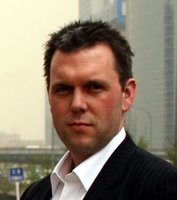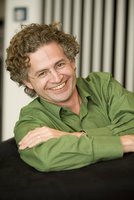
Transforma Think Tank explora o futuro das indústrias criatiavas
(published in Jornal de Negócios 20 Oct 2006)
Dora Ribeiro
doraribeiro@mediafin.pt
Em Portugal não se nota, mas basta ouvir alguns interlocutores internacionais para se perceber que dois mundos aparentemente distantes encontram-se num movimento de acelerada convergência. Estou a falar de cultura e negócios. E a nova tendência é de fusão. Em que cada uma das áreas reinventa-se a si própria, quando em confronto com a outra.
O primeiro e mais óbvio sinal desse encontro é a linguagem. NoTransforma Think Tank, que se reuniu entre 20 e 21 de Outubro, emTorresVedras, aconteceu isso mesmo. AndrewCarmichael, DingemanKuilman e ScottBurnham- algumas das personalidades internacionais convidadas pela associação deTorres Vedras - escolheram cuidadosamente os refrãos. “Modelos de negócio,inovação,modelo organizacional, jogos de poder, parcerias, sustentabilidade, ‘governance’".
Vista de longe, a conversa bem poderia parecer inteiramente empresarial. Mas não era. O objectivo era gerar ideias para que a associação Transforma prossiga o seu objectivo de influenciar culturalmente o seu meio, abrindo simultaneamente as portas ao mundo global. Para isso, disseram diversos convidados, é necessário aprofundar os vínculos e as parcerias locais e internacionais. Num processo outra vez mimético ao que se passa no mundo dos negócios.
Há, como se sabe, novas e variadas razões para a aproximação entre os dois mundos. Na economia globalizada, a informação é a matéria-prima bruta. O valor reside no conhecimento: identidade, conteúdo, estilo, ideias, planos, histórias, conceitos, “design”, moda. Fragmentos de significado que as pessoas podem compreender, usar, valorizar e amar. Tudo obras dos artesãos da nova economia: os empreendedores das indústrias culturais.
Pela importância desse sector, defende o organizador do encontro Michael da Costa, o País deveria apostar em transformar-se num “niche player” com a ajuda das indústrias criativas, que estariam presentes “em cada política e relacionadas à comunicação interna e externa do Portugal moderno”. “Os governos falam apenas de tecnologia, mas o valor real está na inovação simbólica”, reforçou também o director da Fundação Premsela de Amesterdão. Que recordou o facto de que as empresas mais antigas do mundo são aquelas com uma “forte identidade, e que demonstraram abertura para o mundo e capacidade de adaptação organizacional e de mentalidade”. Uma receita que, na opinião do holandês, deve servir igualmente para os empreendimentos culturais.
Scott Burnham, um norte--americano que esteve a trabalhar como director criativo do Urbis, em Manchester, advogou também a favor da liderança cultural como uma rede autónoma de interesses. “As ideias fortes têm uma natureza viral”, fogem ao controle e só assim ganham relevância. Para Andrew Carmichael, que se ocupa da renovação urbanística de um bairro londrino (Lewisham) através das indústrias criativas, são necessários modelos económicos sustentáveis para que a criatividade seja igualmente sustentável e capture a imaginação das comunidades.
Carlos Soares Miguel, presidente da Câmarade Torres Vedras, também esteve presente no Transforma Think Tank (foto do grupo tirada em frente à sede da associação). Na sua intervenção, defendeu que a média dimensão do seu concelho (72 mil habitantes) se reflecte negativamente no apoio financeiro que a cultura ali recebe. “Tem sido uma ajuda esporádica e não continuada no tempo.” A falta de tradição e o reduzido retorno do investimento repercute-se depois num menor envolvimento da comunidade. Para o presidente, a saída para uma associação como a Transforma (que tem recebido ajuda financeira da autarquia) é “ganhar notoriedade”, captar públicos na região e afirmar-se no âmbito nacional. Embora reconheça, contudo, a dificuldade de fundir o interesse das comunidades locais e o dos “media”. “Acho que deve ser um movimento de dentro para fora”, advogou.
CRIATIVIDADE AJUDA A VENDER IMÓVEIS
Um novo distrito em Amesterdão (Zuidas) está a ser construído com base no princípio de que a cultura acrescenta valor ao projecto imobiliário. Ou seja, valoriza financeiramente os terrenos e os imóveis. Por isso, a ING Real State e a Câmara de Amesterdão associaram-se à Fundação Premsela, de divulgação do “design” holandês, para desenvolver a Plataforma 21. Com abertura prevista para 2009, o “anti-museu” pretende direccionar o seu foco para os temas da contemporaneidade e do futuro. O objectivo é criar espaços dinâmicos para uma variedade de projectos e actividades de “design” e moda que inquiram e tragam novas visões sobre o mundo que nos cerca. “Os profissionais não têm o monopólio da criação”, diz Dingeman Kuilman, o director da fundação, por isso mesmo haverá também lugar para iniciativas de amadores. Um ponto de encontro para a criatividade e para novos negócios.




